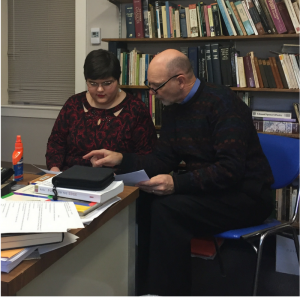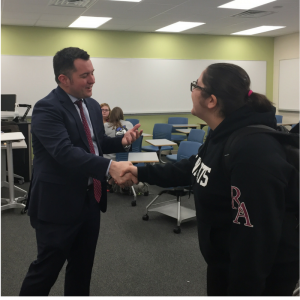Elizabethtown College English Department
writers in action
How to Ask for Help with Coursework
As an English student, you may have lots of questions in class, but you may not want to ask them. Or you think you understand something perfectly in the classroom, but become confused later when you try to do the homework. For these situations and more, there are many methods and benefits of reaching out to people in the English Department – people who want you to succeed.
Who can I ask for help?
Your professor has the most information on each assignment and can probably already tell if you are struggling in the class overall. Professor of English Louis Martin said he invites students to meet with him if he notices them having trouble.
“Accessibility is important, especially at a school like this,” Martin said.
English Department Chair Dr. Matt Skillen agreed, calling being available to students “a component of being a professor.” This is especially true at a college like E-town, where the small class sizes often mean professors know each student’s strengths and weaknesses.
Classmates and friends are also available to help. Sometimes a quick Facebook message is all you need to solve your problem.
For questions about specific assignments, tutors in the Learning Zone are a great resource. Many English classes have assigned tutors who know the ins and outs of specific assignments and what certain professors look for. Tutors have the knowledge of a professor but the friendly vibe of a classmate.
How can I reach out to someone?
Emailing is the most convenient way to reach professors outside of class, whether to make an appointment or to ask a question directly. Skillen makes a point of responding to student emails, even after midnight.
Skillen also ends classes early if he notices confusion among students He said he hopes students use the extra time to approach him and that they usually do. According to Skillen, these end-of-class meetings often lead to answered questions and/or scheduled appointments.
Some professors even encourage phone calls. “I put my home phone number on the syllabus,” Martin said. Whatever the meeting method, Martin said he always tries to put students at ease and make sure they know he wants them to succeed.
Junior English major Melissa Spencer said she usually looks for help by emailing professors her questions, but tries to make in-person meetings when she can. “I’m a person who prefers face-to-face communication, and I think I learn and respond better with that level of communication,” she said.
How will reaching out help me as an English student?
Most importantly, reaching out for help will provide answers to your questions and save you some stress.
It may even motivate you to do well in the class. Last semester, Martin noticed a student struggling to write quotation explications. After meeting with Martin outside of class, the student worked hard and became the class’s best explication writer.
Martin and Skillen agreed that the nature of English as a subject also makes it ideal for student-professor interaction outside of class.
agreed that the nature of English as a subject also makes it ideal for student-professor interaction outside of class.
“English is interactive field that deals with words and ideas, including the words of the professors,” Martin said. “It can help to spend a bit more time making those words and ideas clear.”
Author bio:
Stephanie Miller is a junior English – professional writing major at Elizabethtown College. She is originally from New Jersey but plans to stay in Pennsylvania after graduating. She is Copy Chief of the Etownian newspaper, serves as Secretary of the Stitch2Serve knitting club and dances with the E-motion dance group. In her free time she enjoys knitting, reading anything that isn’t a textbook and silently correcting people’s grammar.